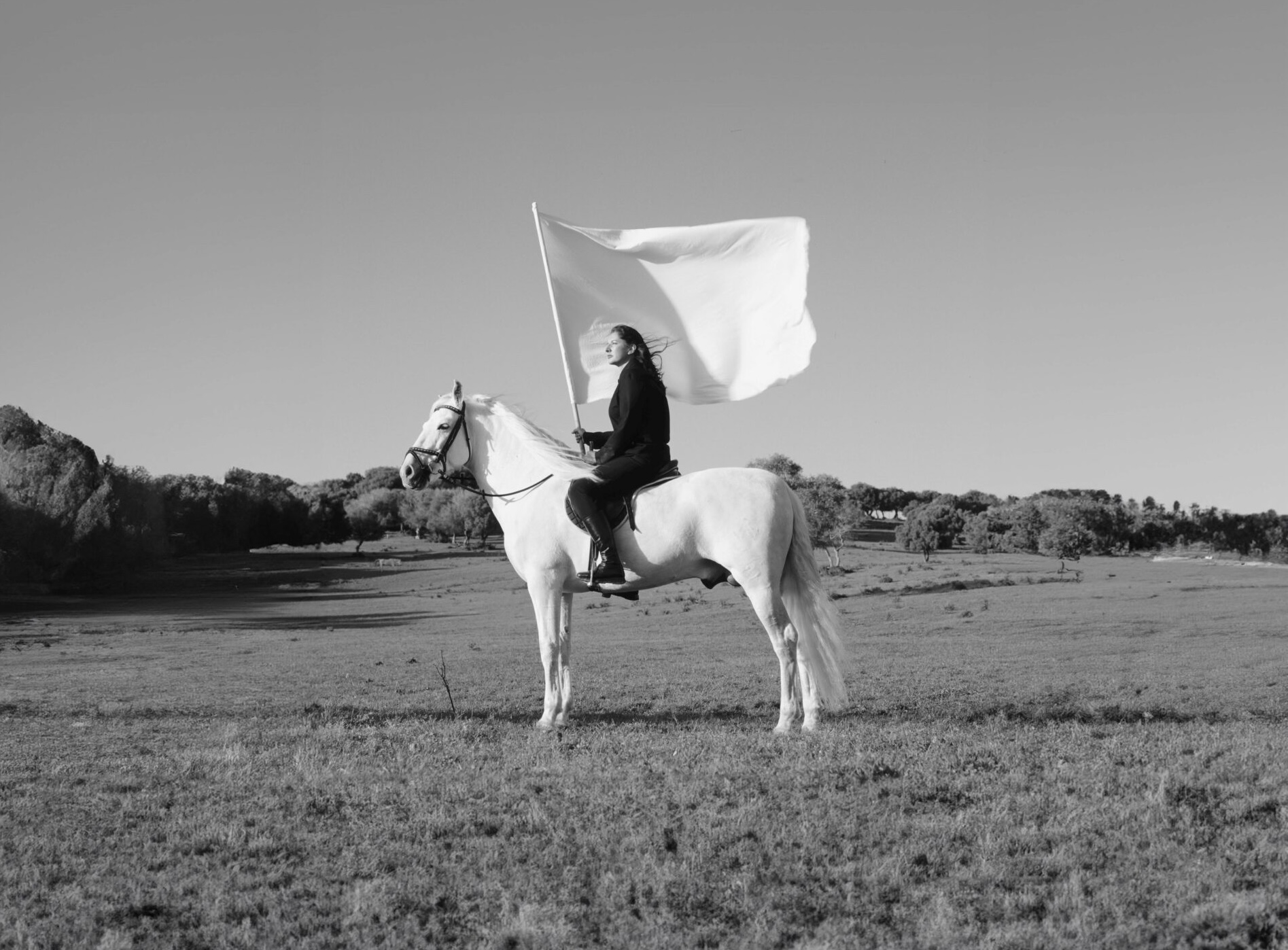

DAMON WINTER/THE NEW YORK TIMES/REDUX
_A conversation with the author about writing, mortality, and keeping your head out of your ass._
-------------------------------------------------------------------------------------------------
After reading George Saunders for a while you start to wonder if there’s anything the guy _can’t_ do. He takes as his aim nothing less than the grandest ambition of all art—to show us how we might live, to create beauty that informs reality—and he makes pulling it off look easy.
If this sounds presumptuous or somehow didactic, don’t worry. He has no interest in being yet another megaphone or opinion-peddler. It’s not his way to tell you. A Saunders story is an active thing. They happen to you. As a reader you are taken irresistibly through their strange machinery, emerging with the indelible mark of experience. His fiction is like a magic mirror, containing worlds that are like ours but _more so_, where the ugliness and beauty of life—its capriciousness and banality and humor and tragedy—are all amplified to become more real and more seeable than they are when you’re in the middle of it all, just trying to get through.
Saunders is rightfully known as a brilliant satirist, and his bitterly funny investigations of our culture’s heart of darkness—where poverty is anything but ennobling to the spirit, where people are commoditized for corporate gain and left intellectually bereft by commercial culture, where petty professional hierarchies and meaningless jobs erode our sense of self—would be enough to secure his reputation even if he stopped there. But his gift for cultural criticism never overwhelms his fundamental compassion for his characters or his readers. He doesn’t collapse into post-modern navel-gazing or nihilism, instead daring to go beyond excoriation to search for solutions, suggesting that there might be a way out from the heart of darkness even if it is comprised of nothing more than the smallest acts of generosity and kindness that are available to us in our limited capacities.
Saunders’ career has taken place primarily within the context of the short story. It seems an ideal fit in many ways, not only for his writing but also for our increasingly bite-sized attention spans. If you wished to spend a bit more time with the ideas and characters it was ok—he has enough to say that before you know it you’re whisked away into another world just as compelling and exciting and strange as the last. But there was always the hope that he might try his hand at a novel, use the depth of the form to expand upon his ideas and offer the reader a sustained experience in his world.
Hence the huge excitement when it was announced that, yes, Saunders was coming out with a novel. A novel about Abraham Lincoln? Taking place in a cemetery over the course of a night that the President, wracked with grief, reportedly spent visiting his beloved son’s newly inhabited crypt? But whose primary setting could more accurately be said to be the Bardo, a liminal, purgatorial space described in Tibetan Buddhism as being between this world and the next where the dead who have not yet abandoned their attachments are trapped, unable to continue to the next life? Ok, Mr. Saunders. You do you.
View fullsize


Courtesy Random House
Spoiler alert: it’s a triumph. Saunders assembles an all-singing, all-dancing cast of dozens of characters (most of whom are dead) to offer a clear-eyed meditation on mortality, grief, acceptance, and the power of love. It is a book full of writerly bravura, set pieces where you think: _there's no way he's going to pull that off._ But he always does. We are taken to the gates of judgement to glimpse the splendors of heaven and the horrors of hell. We see Lincoln's body crowded by a teeming horde of ghosts, sharing in his consciousness. We traverse time and watch the spectral scenery of the bardo mutating like a hallucination.
When I spoke to him he was taking a well-deserved victory lap, “20 cities in 21 days. I look at my phone in the morning and find out where I’m going to be that evening. I think this is what killed Dickens.” He laughs, sounding surprisingly at ease with it all.
When I first read about the premise of _Lincoln In The Bardo_ I was a bit skeptical. It seemed like a strange creative decision for the author. One of my favorite things about his writing is the sense of pure, unfettered innovation. Could he maintain that inventiveness while constrained by the necessity to realistically represent a historical period and figure? And not just any historical figure, mind you, but Mr. President Abraham Lincoln himself? Who in American history has been so totally tokenized, so appropriated—by corporations, by both political parties, by our schoolhouse narrativizing—as Lincoln? His image and name has become shorthand for honesty, sober sacrifice, steely determination, a beard. How does an author cut through all that accrued mythologizing and representation to offer a unique, not to mention interesting, vision?
“Part of it is to know that it’s a problem. When starting something it’s healthy to be struck by the potential difficulties of it. I didn’t want to write Lincoln, but when I realized I was, I definitely didn’t want to write about him in any way that invokes those representations—the Lincoln of the car commercial,” he tells me, with all the assurance, relatable clarity, and gift for illuminating simile of a great writing instructor. Which he is—at Syracuse University.
“So then it became that fictive thing of always trying to swerve towards the specific. I don’t really have anything new to say about Lincoln, the iconic figure. But if you say, ‘It’s 11:46 and Lincoln is just about to enter the crypt. It’s 30 degrees outside. He just rode over on a horse and walked into the complete darkness without a lantern,’ then, suddenly, you’re talking about a body that we can all relate to. And you’re kind of talking about you, of course.”
He continues. “So it’s a little like sawing the woman in half. The magician’s not actually doing it, but he makes it look like he’s doing it. And finally, I have a feeling that a lot of those mythological representations are wrong. So I took the leap of faith to say, “I’m about his age, and I bet—_I bet_—that if I sustained that kind of a loss it would have these effects on me.”
The result of all this consideration is a deeply empathic and intimate portrayal of Lincoln. Saunders revitalizes the icon. This is particularly apparent in a powerful scene where Saunders injects us directly into the president’s psyche as he deals with the crushing weight of his son’s death and the ongoing war to save the Union:
_“He is just one._ _And the weight of it is about to kill me._ _Have exported this grief. Some three thousand times. So far. To date. A mountain. Of boys. Someone’s boys. Must keep on with it. May not have the heart for it.
One thing to pull the lever when blind to the result. But here lies one dear example of what I accomplish by the orders.
I–May not have the heart for it.”_
View fullsize


Even George Saunders was once an amateur—unsure, derivative, struggling to shake the influence of the greats. But unlike the majority of struggling writers, he was able to transcend these struggles and to invent something wholly new. How did he manage this transition? Asking for a friend, of course.
“One thing to recognize is that that phase of being influenced is a very natural part of the writer’s journey. But it makes you increasingly uncomfortable, because you know you’re a grown person who’s living a full emotional life, so why in the world doesn’t your voice reflect that? I think what happens is life comes in, and loads you up with highly particular experiences and hurt and moments of beauty that somehow aren’t expressible in the ‘Master’s voice’. That’s what happened to me anyway—I loved all these writers so much, but I eventually reached a point where I said to myself ‘I think I know something that that person doesn’t know’, and that’s when I made the transition—my own knowledge and experience was coming out onto the page, and with it came a style and form particular to me.”
As our conversation briefly takes a turn toward writer’s insider baseball (mostly due to my inability to resist the chance to probe a master for some insight), I asked Saunders about his idiosyncratic position within contemporary literary culture, and if he sees himself as being aligned with any larger movements.
“I found very early on that I have a fairly small box of talent. I’m not really a great intellectual, and I’m not very well trained in literature, so for me I found that if I put certain questions aside it helped me to write better. When I started thinking about literary movements that only messed me up,” he tells me. “So, I decided—what if we just said, ‘I don’t know?’ It’s almost like if someone asked you what kind of dancer you are and you go, ‘Hey, watch me dance.’ It’s better to just do the thing and let somebody else figure it out, because then you’re not impeded by expectation, from you or from anybody else.”
And here’s that gift for simile again: “If you were drowning in water full of obstacles, you would just do whatever you could do to keep your head above water. Now, if someone was filming you they might be able to talk about your swimming style, but at the time you’re just trying to stay alive. That’s how I look at it.”
One of the consequences of such a grueling tour and of his writing so well on such monolithic, ungraspable subjects (death, for one) is that Saunders is often placed in the position of the sage. People can’t resist coming to him with their anxieties, hoping for an answer of some kind. I couldn’t. This position doesn’t necessarily sit comfortably with him, though that doesn’t mean he’s not excellent within it. He abhors glibness, but he admits it can be tempting to lapse into it when you’re asked, over and over again, to speak with authority about such a deep subject. Saunders is also a practicing Buddhist, and his belief comes through in his writing and outlook. He evinces a contagious, contemplative calm earned from the hard work of seeing things as they are and coming to terms with those truths. So people keep asking. Who doesn’t want a shortcut to inner peace?
“It’s interesting, because on this tour there are a lot of questions about death, and I keep falling into a role of somebody who has something to say about that. The big enemy is autopilot, and it’s easy to do when you’re talking about a book like this a lot—you kind of fall into ‘Here’s the truth’, when what you need to be doing is constantly questioning, admitting that you don’t know,” he tells me. “What humans really like to do is rest—we’re always trying to find some mental comfort. And I think one of the dangers in any kind of philosophical thinking is taking a stance, and falling back on that. It’s nice to have a stance, whereas maybe the best stance is the non-stance, but even that can become a stance!” He laughs. “When I set off on this tour my wife told me, ‘Stay hydrated and keep your head out of your ass.’ So I’m just trying to do that.”
But Saunders _does_ have something to say on the subject. For one, he’s had a much closer encounter with imminent death than the average healthy person. On a flight he took years ago he was guiltily enjoying Vanity Fair when a series of stomach-turning crashes rocked the airplane_._ Smoke pours from the air vents, everyone’s screaming, the usually assuaging voice of the pilot panicked as he tells everyone to buckle up, the lights of the city below rapidly drawing near as they went in for an emergency landing at O’Hare.
“At that moment the fear was so great that I could barely remember my own name,” he tells me. “The actual fear of one’s death when you think it’s really coming is so severe that at least in that case it became a physical thing. I tried to keep that in mind as I was having fun dreaming up the afterlife for my book: that the moment when you die is in reality totally unimaginable to those of us who are in good health and walking around.” It turned out that the plane was nearly downed by an unlucky flock of geese.
View fullsize


Early 18th century Tibetan depiction of Yamantaka, "Destroyer of the God of Death".
This open-eyed awareness of our ultimate fate is not just an intellectual or philosophical exercise for Saunders. It’s spiritual. A bedrock of his belief is that one should continuously resist hackneyed thinking, self-delusion, and intellectual complacency—especially when it comes to death, which in its fundamental unknowability tends to squelch thought, reducing our response, if we’re not careful, to platitudes and clichés.
“One of the things I’ve done in the past is to kind of have a facile idea of spirituality,” he explains. “Even saying something which I believe to be true—for example: whatever your mind is like right now, that will bear some relation to your mind after death, if one continues. I believe that. But I also think that you can get a little lazy believing something like that. It’s like if someone approaches the world’s most shocking rollercoaster ride and you look at it and you go, ‘Yeah, that’s going to be really scary, and I’ll probably be disoriented.’ Ok, well that’s good, but that’s not actually being disoriented. When you actually go down it will be an entirely different level of experience. So,” he chuckles, “comforting words.”
But is all this thinking about death actually good for us? Isn’t the proper response something more akin to Woody Allen’s suggestion that the point of life (and art, work, love, etc.) is to distract ourselves from our own impermanence? Saunders doesn’t think so.
“That’s an almost perfect definition of what a viable spiritual life is—to keep death in your sights a little bit. And not to be goth or morbid, but to say, yeah that’s how it is, so how can I sustain joy and productiveness even in the face of that truth?” He continues. “For example, if you have to go to the dentist on Wednesday, you plan on it, and no one says you’re morbid. To have some awareness of death is beneficial. If you and I are together, and we’re both very aware that we’re going to be dead someday—it inflects on the way that we act, on how we treat each other. If nothing else you get a little more of a gratitude mind—you enjoy what’s around you, because you’re not dead right now, and this coffee tastes pretty good, you know?”
_Lincoln In The Bardo_’s release seemed divinely timed. There’s something strangely consoling about knowing that as scary as things are now and as divided as we are now as a country it has been much worse in the past, and that we emerged from it wounded but ultimately stronger. It’s a blessing to have literature to remind us of the breadth of the world and experience, to take us out of the eternal _now_ and offer a space for reflection on those fuzzy but crucial things like love, mortality, compassion, and endurance. You can’t help but come out of a Saunders story slightly changed. It’s like someone took a scrub brush to all those calcified assumptions, cleaned the grime off your glasses, and removed the blinders of your pinched worldview. Spend enough time looking at the world through his lens and his outlook sticks with you.
* * *
Written by Sid Feddema
 
DAMON WINTER/THE NEW YORK TIMES/REDUX
_A conversation with the author about writing, mortality, and keeping your head out of your ass._
-------------------------------------------------------------------------------------------------
After reading George Saunders for a while you start to wonder if there’s anything the guy _can’t_ do. He takes as his aim nothing less than the grandest ambition of all art—to show us how we might live, to create beauty that informs reality—and he makes pulling it off look easy.
If this sounds presumptuous or somehow didactic, don’t worry. He has no interest in being yet another megaphone or opinion-peddler. It’s not his way to tell you. A Saunders story is an active thing. They happen to you. As a reader you are taken irresistibly through their strange machinery, emerging with the indelible mark of experience. His fiction is like a magic mirror, containing worlds that are like ours but _more so_, where the ugliness and beauty of life—its capriciousness and banality and humor and tragedy—are all amplified to become more real and more seeable than they are when you’re in the middle of it all, just trying to get through.
Saunders is rightfully known as a brilliant satirist, and his bitterly funny investigations of our culture’s heart of darkness—where poverty is anything but ennobling to the spirit, where people are commoditized for corporate gain and left intellectually bereft by commercial culture, where petty professional hierarchies and meaningless jobs erode our sense of self—would be enough to secure his reputation even if he stopped there. But his gift for cultural criticism never overwhelms his fundamental compassion for his characters or his readers. He doesn’t collapse into post-modern navel-gazing or nihilism, instead daring to go beyond excoriation to search for solutions, suggesting that there might be a way out from the heart of darkness even if it is comprised of nothing more than the smallest acts of generosity and kindness that are available to us in our limited capacities.
Saunders’ career has taken place primarily within the context of the short story. It seems an ideal fit in many ways, not only for his writing but also for our increasingly bite-sized attention spans. If you wished to spend a bit more time with the ideas and characters it was ok—he has enough to say that before you know it you’re whisked away into another world just as compelling and exciting and strange as the last. But there was always the hope that he might try his hand at a novel, use the depth of the form to expand upon his ideas and offer the reader a sustained experience in his world.
Hence the huge excitement when it was announced that, yes, Saunders was coming out with a novel. A novel about Abraham Lincoln? Taking place in a cemetery over the course of a night that the President, wracked with grief, reportedly spent visiting his beloved son’s newly inhabited crypt? But whose primary setting could more accurately be said to be the Bardo, a liminal, purgatorial space described in Tibetan Buddhism as being between this world and the next where the dead who have not yet abandoned their attachments are trapped, unable to continue to the next life? Ok, Mr. Saunders. You do you.
View fullsize

DAMON WINTER/THE NEW YORK TIMES/REDUX
_A conversation with the author about writing, mortality, and keeping your head out of your ass._
-------------------------------------------------------------------------------------------------
After reading George Saunders for a while you start to wonder if there’s anything the guy _can’t_ do. He takes as his aim nothing less than the grandest ambition of all art—to show us how we might live, to create beauty that informs reality—and he makes pulling it off look easy.
If this sounds presumptuous or somehow didactic, don’t worry. He has no interest in being yet another megaphone or opinion-peddler. It’s not his way to tell you. A Saunders story is an active thing. They happen to you. As a reader you are taken irresistibly through their strange machinery, emerging with the indelible mark of experience. His fiction is like a magic mirror, containing worlds that are like ours but _more so_, where the ugliness and beauty of life—its capriciousness and banality and humor and tragedy—are all amplified to become more real and more seeable than they are when you’re in the middle of it all, just trying to get through.
Saunders is rightfully known as a brilliant satirist, and his bitterly funny investigations of our culture’s heart of darkness—where poverty is anything but ennobling to the spirit, where people are commoditized for corporate gain and left intellectually bereft by commercial culture, where petty professional hierarchies and meaningless jobs erode our sense of self—would be enough to secure his reputation even if he stopped there. But his gift for cultural criticism never overwhelms his fundamental compassion for his characters or his readers. He doesn’t collapse into post-modern navel-gazing or nihilism, instead daring to go beyond excoriation to search for solutions, suggesting that there might be a way out from the heart of darkness even if it is comprised of nothing more than the smallest acts of generosity and kindness that are available to us in our limited capacities.
Saunders’ career has taken place primarily within the context of the short story. It seems an ideal fit in many ways, not only for his writing but also for our increasingly bite-sized attention spans. If you wished to spend a bit more time with the ideas and characters it was ok—he has enough to say that before you know it you’re whisked away into another world just as compelling and exciting and strange as the last. But there was always the hope that he might try his hand at a novel, use the depth of the form to expand upon his ideas and offer the reader a sustained experience in his world.
Hence the huge excitement when it was announced that, yes, Saunders was coming out with a novel. A novel about Abraham Lincoln? Taking place in a cemetery over the course of a night that the President, wracked with grief, reportedly spent visiting his beloved son’s newly inhabited crypt? But whose primary setting could more accurately be said to be the Bardo, a liminal, purgatorial space described in Tibetan Buddhism as being between this world and the next where the dead who have not yet abandoned their attachments are trapped, unable to continue to the next life? Ok, Mr. Saunders. You do you.
View fullsize
 
Courtesy Random House
Spoiler alert: it’s a triumph. Saunders assembles an all-singing, all-dancing cast of dozens of characters (most of whom are dead) to offer a clear-eyed meditation on mortality, grief, acceptance, and the power of love. It is a book full of writerly bravura, set pieces where you think: _there's no way he's going to pull that off._ But he always does. We are taken to the gates of judgement to glimpse the splendors of heaven and the horrors of hell. We see Lincoln's body crowded by a teeming horde of ghosts, sharing in his consciousness. We traverse time and watch the spectral scenery of the bardo mutating like a hallucination.
When I spoke to him he was taking a well-deserved victory lap, “20 cities in 21 days. I look at my phone in the morning and find out where I’m going to be that evening. I think this is what killed Dickens.” He laughs, sounding surprisingly at ease with it all.
When I first read about the premise of _Lincoln In The Bardo_ I was a bit skeptical. It seemed like a strange creative decision for the author. One of my favorite things about his writing is the sense of pure, unfettered innovation. Could he maintain that inventiveness while constrained by the necessity to realistically represent a historical period and figure? And not just any historical figure, mind you, but Mr. President Abraham Lincoln himself? Who in American history has been so totally tokenized, so appropriated—by corporations, by both political parties, by our schoolhouse narrativizing—as Lincoln? His image and name has become shorthand for honesty, sober sacrifice, steely determination, a beard. How does an author cut through all that accrued mythologizing and representation to offer a unique, not to mention interesting, vision?
“Part of it is to know that it’s a problem. When starting something it’s healthy to be struck by the potential difficulties of it. I didn’t want to write Lincoln, but when I realized I was, I definitely didn’t want to write about him in any way that invokes those representations—the Lincoln of the car commercial,” he tells me, with all the assurance, relatable clarity, and gift for illuminating simile of a great writing instructor. Which he is—at Syracuse University.
“So then it became that fictive thing of always trying to swerve towards the specific. I don’t really have anything new to say about Lincoln, the iconic figure. But if you say, ‘It’s 11:46 and Lincoln is just about to enter the crypt. It’s 30 degrees outside. He just rode over on a horse and walked into the complete darkness without a lantern,’ then, suddenly, you’re talking about a body that we can all relate to. And you’re kind of talking about you, of course.”
He continues. “So it’s a little like sawing the woman in half. The magician’s not actually doing it, but he makes it look like he’s doing it. And finally, I have a feeling that a lot of those mythological representations are wrong. So I took the leap of faith to say, “I’m about his age, and I bet—_I bet_—that if I sustained that kind of a loss it would have these effects on me.”
The result of all this consideration is a deeply empathic and intimate portrayal of Lincoln. Saunders revitalizes the icon. This is particularly apparent in a powerful scene where Saunders injects us directly into the president’s psyche as he deals with the crushing weight of his son’s death and the ongoing war to save the Union:
_“He is just one._ _And the weight of it is about to kill me._ _Have exported this grief. Some three thousand times. So far. To date. A mountain. Of boys. Someone’s boys. Must keep on with it. May not have the heart for it.
One thing to pull the lever when blind to the result. But here lies one dear example of what I accomplish by the orders.
I–May not have the heart for it.”_
View fullsize

Courtesy Random House
Spoiler alert: it’s a triumph. Saunders assembles an all-singing, all-dancing cast of dozens of characters (most of whom are dead) to offer a clear-eyed meditation on mortality, grief, acceptance, and the power of love. It is a book full of writerly bravura, set pieces where you think: _there's no way he's going to pull that off._ But he always does. We are taken to the gates of judgement to glimpse the splendors of heaven and the horrors of hell. We see Lincoln's body crowded by a teeming horde of ghosts, sharing in his consciousness. We traverse time and watch the spectral scenery of the bardo mutating like a hallucination.
When I spoke to him he was taking a well-deserved victory lap, “20 cities in 21 days. I look at my phone in the morning and find out where I’m going to be that evening. I think this is what killed Dickens.” He laughs, sounding surprisingly at ease with it all.
When I first read about the premise of _Lincoln In The Bardo_ I was a bit skeptical. It seemed like a strange creative decision for the author. One of my favorite things about his writing is the sense of pure, unfettered innovation. Could he maintain that inventiveness while constrained by the necessity to realistically represent a historical period and figure? And not just any historical figure, mind you, but Mr. President Abraham Lincoln himself? Who in American history has been so totally tokenized, so appropriated—by corporations, by both political parties, by our schoolhouse narrativizing—as Lincoln? His image and name has become shorthand for honesty, sober sacrifice, steely determination, a beard. How does an author cut through all that accrued mythologizing and representation to offer a unique, not to mention interesting, vision?
“Part of it is to know that it’s a problem. When starting something it’s healthy to be struck by the potential difficulties of it. I didn’t want to write Lincoln, but when I realized I was, I definitely didn’t want to write about him in any way that invokes those representations—the Lincoln of the car commercial,” he tells me, with all the assurance, relatable clarity, and gift for illuminating simile of a great writing instructor. Which he is—at Syracuse University.
“So then it became that fictive thing of always trying to swerve towards the specific. I don’t really have anything new to say about Lincoln, the iconic figure. But if you say, ‘It’s 11:46 and Lincoln is just about to enter the crypt. It’s 30 degrees outside. He just rode over on a horse and walked into the complete darkness without a lantern,’ then, suddenly, you’re talking about a body that we can all relate to. And you’re kind of talking about you, of course.”
He continues. “So it’s a little like sawing the woman in half. The magician’s not actually doing it, but he makes it look like he’s doing it. And finally, I have a feeling that a lot of those mythological representations are wrong. So I took the leap of faith to say, “I’m about his age, and I bet—_I bet_—that if I sustained that kind of a loss it would have these effects on me.”
The result of all this consideration is a deeply empathic and intimate portrayal of Lincoln. Saunders revitalizes the icon. This is particularly apparent in a powerful scene where Saunders injects us directly into the president’s psyche as he deals with the crushing weight of his son’s death and the ongoing war to save the Union:
_“He is just one._ _And the weight of it is about to kill me._ _Have exported this grief. Some three thousand times. So far. To date. A mountain. Of boys. Someone’s boys. Must keep on with it. May not have the heart for it.
One thing to pull the lever when blind to the result. But here lies one dear example of what I accomplish by the orders.
I–May not have the heart for it.”_
View fullsize
 
Even George Saunders was once an amateur—unsure, derivative, struggling to shake the influence of the greats. But unlike the majority of struggling writers, he was able to transcend these struggles and to invent something wholly new. How did he manage this transition? Asking for a friend, of course.
“One thing to recognize is that that phase of being influenced is a very natural part of the writer’s journey. But it makes you increasingly uncomfortable, because you know you’re a grown person who’s living a full emotional life, so why in the world doesn’t your voice reflect that? I think what happens is life comes in, and loads you up with highly particular experiences and hurt and moments of beauty that somehow aren’t expressible in the ‘Master’s voice’. That’s what happened to me anyway—I loved all these writers so much, but I eventually reached a point where I said to myself ‘I think I know something that that person doesn’t know’, and that’s when I made the transition—my own knowledge and experience was coming out onto the page, and with it came a style and form particular to me.”
As our conversation briefly takes a turn toward writer’s insider baseball (mostly due to my inability to resist the chance to probe a master for some insight), I asked Saunders about his idiosyncratic position within contemporary literary culture, and if he sees himself as being aligned with any larger movements.
“I found very early on that I have a fairly small box of talent. I’m not really a great intellectual, and I’m not very well trained in literature, so for me I found that if I put certain questions aside it helped me to write better. When I started thinking about literary movements that only messed me up,” he tells me. “So, I decided—what if we just said, ‘I don’t know?’ It’s almost like if someone asked you what kind of dancer you are and you go, ‘Hey, watch me dance.’ It’s better to just do the thing and let somebody else figure it out, because then you’re not impeded by expectation, from you or from anybody else.”
And here’s that gift for simile again: “If you were drowning in water full of obstacles, you would just do whatever you could do to keep your head above water. Now, if someone was filming you they might be able to talk about your swimming style, but at the time you’re just trying to stay alive. That’s how I look at it.”
One of the consequences of such a grueling tour and of his writing so well on such monolithic, ungraspable subjects (death, for one) is that Saunders is often placed in the position of the sage. People can’t resist coming to him with their anxieties, hoping for an answer of some kind. I couldn’t. This position doesn’t necessarily sit comfortably with him, though that doesn’t mean he’s not excellent within it. He abhors glibness, but he admits it can be tempting to lapse into it when you’re asked, over and over again, to speak with authority about such a deep subject. Saunders is also a practicing Buddhist, and his belief comes through in his writing and outlook. He evinces a contagious, contemplative calm earned from the hard work of seeing things as they are and coming to terms with those truths. So people keep asking. Who doesn’t want a shortcut to inner peace?
“It’s interesting, because on this tour there are a lot of questions about death, and I keep falling into a role of somebody who has something to say about that. The big enemy is autopilot, and it’s easy to do when you’re talking about a book like this a lot—you kind of fall into ‘Here’s the truth’, when what you need to be doing is constantly questioning, admitting that you don’t know,” he tells me. “What humans really like to do is rest—we’re always trying to find some mental comfort. And I think one of the dangers in any kind of philosophical thinking is taking a stance, and falling back on that. It’s nice to have a stance, whereas maybe the best stance is the non-stance, but even that can become a stance!” He laughs. “When I set off on this tour my wife told me, ‘Stay hydrated and keep your head out of your ass.’ So I’m just trying to do that.”
But Saunders _does_ have something to say on the subject. For one, he’s had a much closer encounter with imminent death than the average healthy person. On a flight he took years ago he was guiltily enjoying Vanity Fair when a series of stomach-turning crashes rocked the airplane_._ Smoke pours from the air vents, everyone’s screaming, the usually assuaging voice of the pilot panicked as he tells everyone to buckle up, the lights of the city below rapidly drawing near as they went in for an emergency landing at O’Hare.
“At that moment the fear was so great that I could barely remember my own name,” he tells me. “The actual fear of one’s death when you think it’s really coming is so severe that at least in that case it became a physical thing. I tried to keep that in mind as I was having fun dreaming up the afterlife for my book: that the moment when you die is in reality totally unimaginable to those of us who are in good health and walking around.” It turned out that the plane was nearly downed by an unlucky flock of geese.
View fullsize

Even George Saunders was once an amateur—unsure, derivative, struggling to shake the influence of the greats. But unlike the majority of struggling writers, he was able to transcend these struggles and to invent something wholly new. How did he manage this transition? Asking for a friend, of course.
“One thing to recognize is that that phase of being influenced is a very natural part of the writer’s journey. But it makes you increasingly uncomfortable, because you know you’re a grown person who’s living a full emotional life, so why in the world doesn’t your voice reflect that? I think what happens is life comes in, and loads you up with highly particular experiences and hurt and moments of beauty that somehow aren’t expressible in the ‘Master’s voice’. That’s what happened to me anyway—I loved all these writers so much, but I eventually reached a point where I said to myself ‘I think I know something that that person doesn’t know’, and that’s when I made the transition—my own knowledge and experience was coming out onto the page, and with it came a style and form particular to me.”
As our conversation briefly takes a turn toward writer’s insider baseball (mostly due to my inability to resist the chance to probe a master for some insight), I asked Saunders about his idiosyncratic position within contemporary literary culture, and if he sees himself as being aligned with any larger movements.
“I found very early on that I have a fairly small box of talent. I’m not really a great intellectual, and I’m not very well trained in literature, so for me I found that if I put certain questions aside it helped me to write better. When I started thinking about literary movements that only messed me up,” he tells me. “So, I decided—what if we just said, ‘I don’t know?’ It’s almost like if someone asked you what kind of dancer you are and you go, ‘Hey, watch me dance.’ It’s better to just do the thing and let somebody else figure it out, because then you’re not impeded by expectation, from you or from anybody else.”
And here’s that gift for simile again: “If you were drowning in water full of obstacles, you would just do whatever you could do to keep your head above water. Now, if someone was filming you they might be able to talk about your swimming style, but at the time you’re just trying to stay alive. That’s how I look at it.”
One of the consequences of such a grueling tour and of his writing so well on such monolithic, ungraspable subjects (death, for one) is that Saunders is often placed in the position of the sage. People can’t resist coming to him with their anxieties, hoping for an answer of some kind. I couldn’t. This position doesn’t necessarily sit comfortably with him, though that doesn’t mean he’s not excellent within it. He abhors glibness, but he admits it can be tempting to lapse into it when you’re asked, over and over again, to speak with authority about such a deep subject. Saunders is also a practicing Buddhist, and his belief comes through in his writing and outlook. He evinces a contagious, contemplative calm earned from the hard work of seeing things as they are and coming to terms with those truths. So people keep asking. Who doesn’t want a shortcut to inner peace?
“It’s interesting, because on this tour there are a lot of questions about death, and I keep falling into a role of somebody who has something to say about that. The big enemy is autopilot, and it’s easy to do when you’re talking about a book like this a lot—you kind of fall into ‘Here’s the truth’, when what you need to be doing is constantly questioning, admitting that you don’t know,” he tells me. “What humans really like to do is rest—we’re always trying to find some mental comfort. And I think one of the dangers in any kind of philosophical thinking is taking a stance, and falling back on that. It’s nice to have a stance, whereas maybe the best stance is the non-stance, but even that can become a stance!” He laughs. “When I set off on this tour my wife told me, ‘Stay hydrated and keep your head out of your ass.’ So I’m just trying to do that.”
But Saunders _does_ have something to say on the subject. For one, he’s had a much closer encounter with imminent death than the average healthy person. On a flight he took years ago he was guiltily enjoying Vanity Fair when a series of stomach-turning crashes rocked the airplane_._ Smoke pours from the air vents, everyone’s screaming, the usually assuaging voice of the pilot panicked as he tells everyone to buckle up, the lights of the city below rapidly drawing near as they went in for an emergency landing at O’Hare.
“At that moment the fear was so great that I could barely remember my own name,” he tells me. “The actual fear of one’s death when you think it’s really coming is so severe that at least in that case it became a physical thing. I tried to keep that in mind as I was having fun dreaming up the afterlife for my book: that the moment when you die is in reality totally unimaginable to those of us who are in good health and walking around.” It turned out that the plane was nearly downed by an unlucky flock of geese.
View fullsize
 
Early 18th century Tibetan depiction of Yamantaka, "Destroyer of the God of Death".
This open-eyed awareness of our ultimate fate is not just an intellectual or philosophical exercise for Saunders. It’s spiritual. A bedrock of his belief is that one should continuously resist hackneyed thinking, self-delusion, and intellectual complacency—especially when it comes to death, which in its fundamental unknowability tends to squelch thought, reducing our response, if we’re not careful, to platitudes and clichés.
“One of the things I’ve done in the past is to kind of have a facile idea of spirituality,” he explains. “Even saying something which I believe to be true—for example: whatever your mind is like right now, that will bear some relation to your mind after death, if one continues. I believe that. But I also think that you can get a little lazy believing something like that. It’s like if someone approaches the world’s most shocking rollercoaster ride and you look at it and you go, ‘Yeah, that’s going to be really scary, and I’ll probably be disoriented.’ Ok, well that’s good, but that’s not actually being disoriented. When you actually go down it will be an entirely different level of experience. So,” he chuckles, “comforting words.”
But is all this thinking about death actually good for us? Isn’t the proper response something more akin to Woody Allen’s suggestion that the point of life (and art, work, love, etc.) is to distract ourselves from our own impermanence? Saunders doesn’t think so.
“That’s an almost perfect definition of what a viable spiritual life is—to keep death in your sights a little bit. And not to be goth or morbid, but to say, yeah that’s how it is, so how can I sustain joy and productiveness even in the face of that truth?” He continues. “For example, if you have to go to the dentist on Wednesday, you plan on it, and no one says you’re morbid. To have some awareness of death is beneficial. If you and I are together, and we’re both very aware that we’re going to be dead someday—it inflects on the way that we act, on how we treat each other. If nothing else you get a little more of a gratitude mind—you enjoy what’s around you, because you’re not dead right now, and this coffee tastes pretty good, you know?”
_Lincoln In The Bardo_’s release seemed divinely timed. There’s something strangely consoling about knowing that as scary as things are now and as divided as we are now as a country it has been much worse in the past, and that we emerged from it wounded but ultimately stronger. It’s a blessing to have literature to remind us of the breadth of the world and experience, to take us out of the eternal _now_ and offer a space for reflection on those fuzzy but crucial things like love, mortality, compassion, and endurance. You can’t help but come out of a Saunders story slightly changed. It’s like someone took a scrub brush to all those calcified assumptions, cleaned the grime off your glasses, and removed the blinders of your pinched worldview. Spend enough time looking at the world through his lens and his outlook sticks with you.
* * *
Written by Sid Feddema

Early 18th century Tibetan depiction of Yamantaka, "Destroyer of the God of Death".
This open-eyed awareness of our ultimate fate is not just an intellectual or philosophical exercise for Saunders. It’s spiritual. A bedrock of his belief is that one should continuously resist hackneyed thinking, self-delusion, and intellectual complacency—especially when it comes to death, which in its fundamental unknowability tends to squelch thought, reducing our response, if we’re not careful, to platitudes and clichés.
“One of the things I’ve done in the past is to kind of have a facile idea of spirituality,” he explains. “Even saying something which I believe to be true—for example: whatever your mind is like right now, that will bear some relation to your mind after death, if one continues. I believe that. But I also think that you can get a little lazy believing something like that. It’s like if someone approaches the world’s most shocking rollercoaster ride and you look at it and you go, ‘Yeah, that’s going to be really scary, and I’ll probably be disoriented.’ Ok, well that’s good, but that’s not actually being disoriented. When you actually go down it will be an entirely different level of experience. So,” he chuckles, “comforting words.”
But is all this thinking about death actually good for us? Isn’t the proper response something more akin to Woody Allen’s suggestion that the point of life (and art, work, love, etc.) is to distract ourselves from our own impermanence? Saunders doesn’t think so.
“That’s an almost perfect definition of what a viable spiritual life is—to keep death in your sights a little bit. And not to be goth or morbid, but to say, yeah that’s how it is, so how can I sustain joy and productiveness even in the face of that truth?” He continues. “For example, if you have to go to the dentist on Wednesday, you plan on it, and no one says you’re morbid. To have some awareness of death is beneficial. If you and I are together, and we’re both very aware that we’re going to be dead someday—it inflects on the way that we act, on how we treat each other. If nothing else you get a little more of a gratitude mind—you enjoy what’s around you, because you’re not dead right now, and this coffee tastes pretty good, you know?”
_Lincoln In The Bardo_’s release seemed divinely timed. There’s something strangely consoling about knowing that as scary as things are now and as divided as we are now as a country it has been much worse in the past, and that we emerged from it wounded but ultimately stronger. It’s a blessing to have literature to remind us of the breadth of the world and experience, to take us out of the eternal _now_ and offer a space for reflection on those fuzzy but crucial things like love, mortality, compassion, and endurance. You can’t help but come out of a Saunders story slightly changed. It’s like someone took a scrub brush to all those calcified assumptions, cleaned the grime off your glasses, and removed the blinders of your pinched worldview. Spend enough time looking at the world through his lens and his outlook sticks with you.
* * *
Written by Sid Feddema
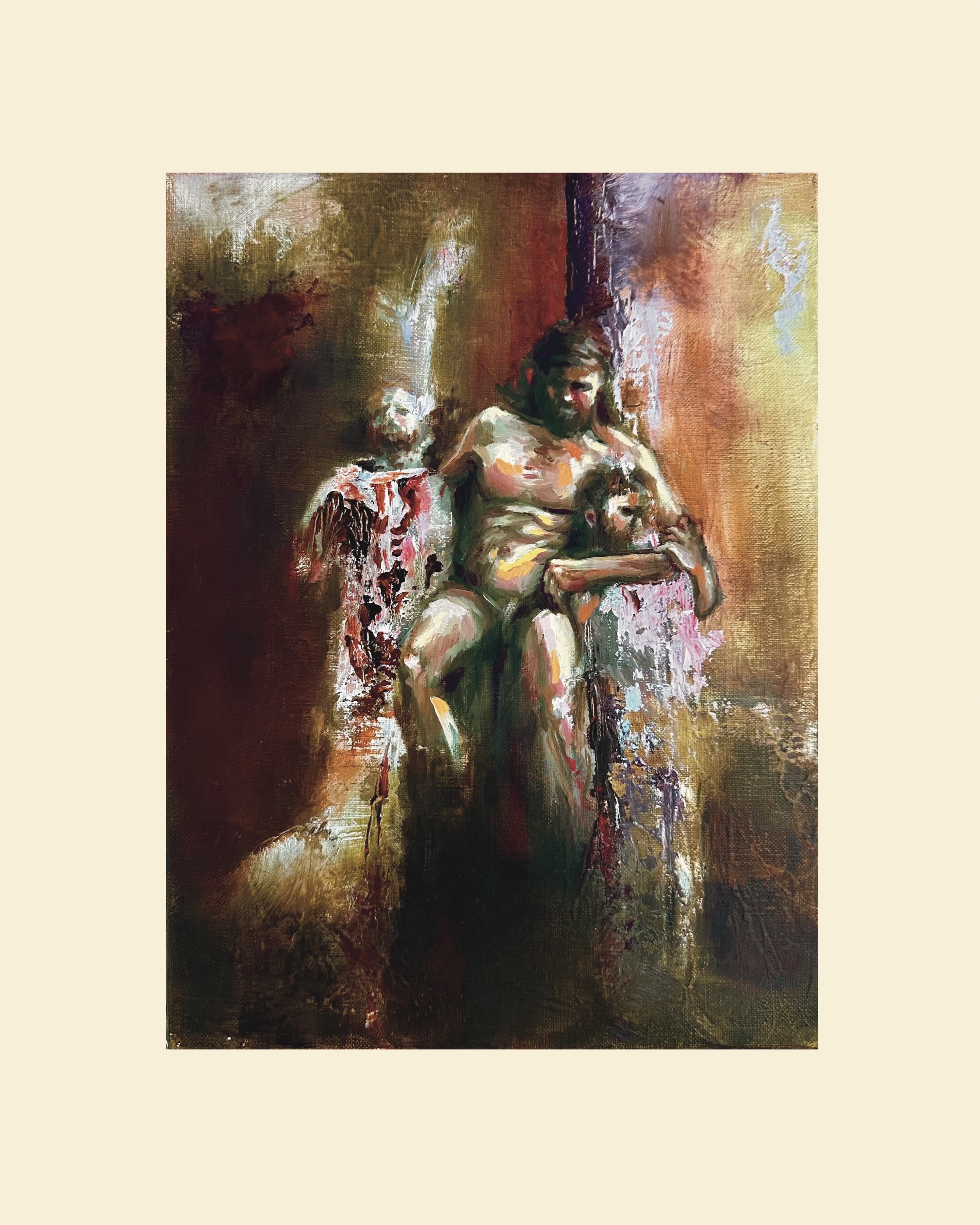


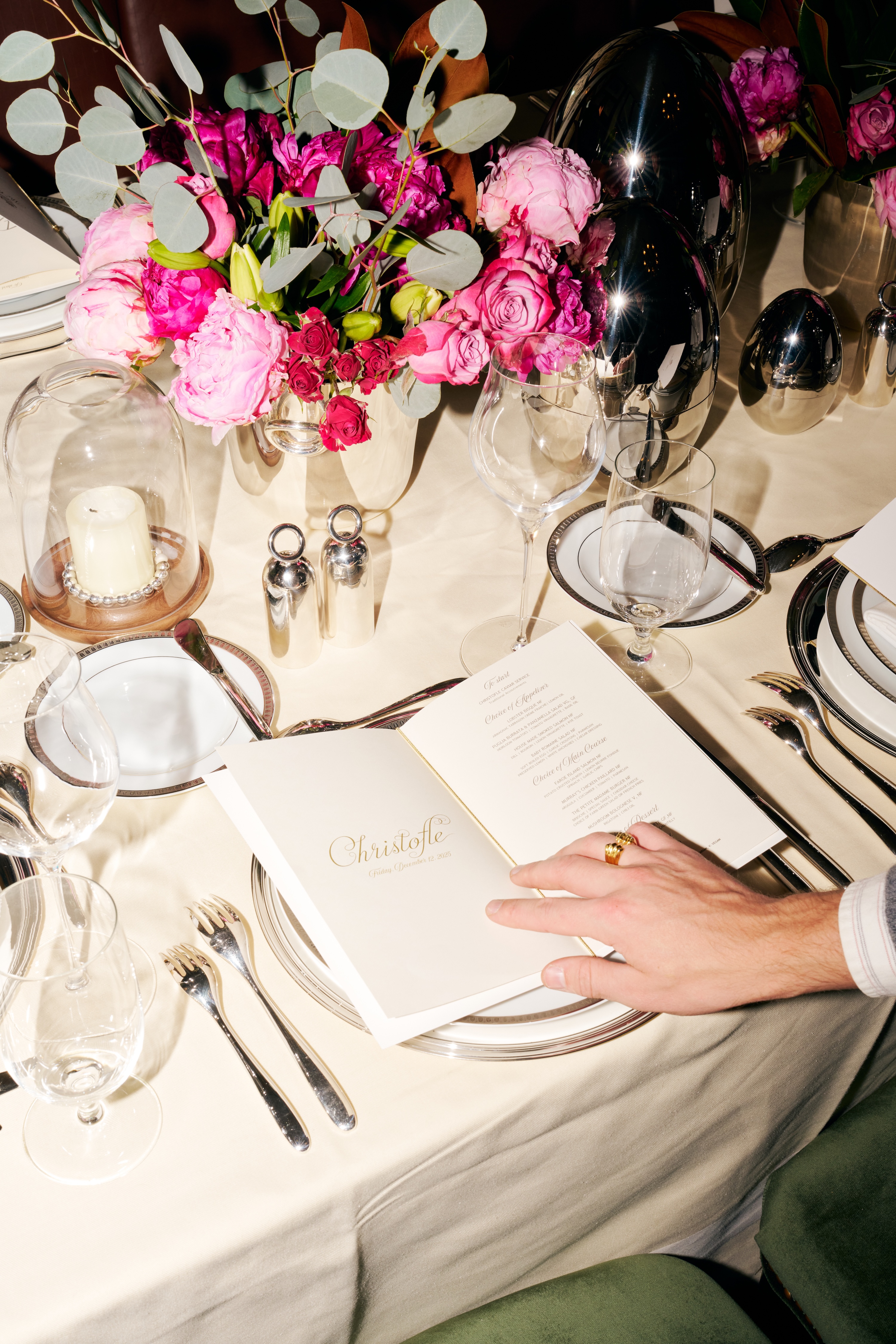
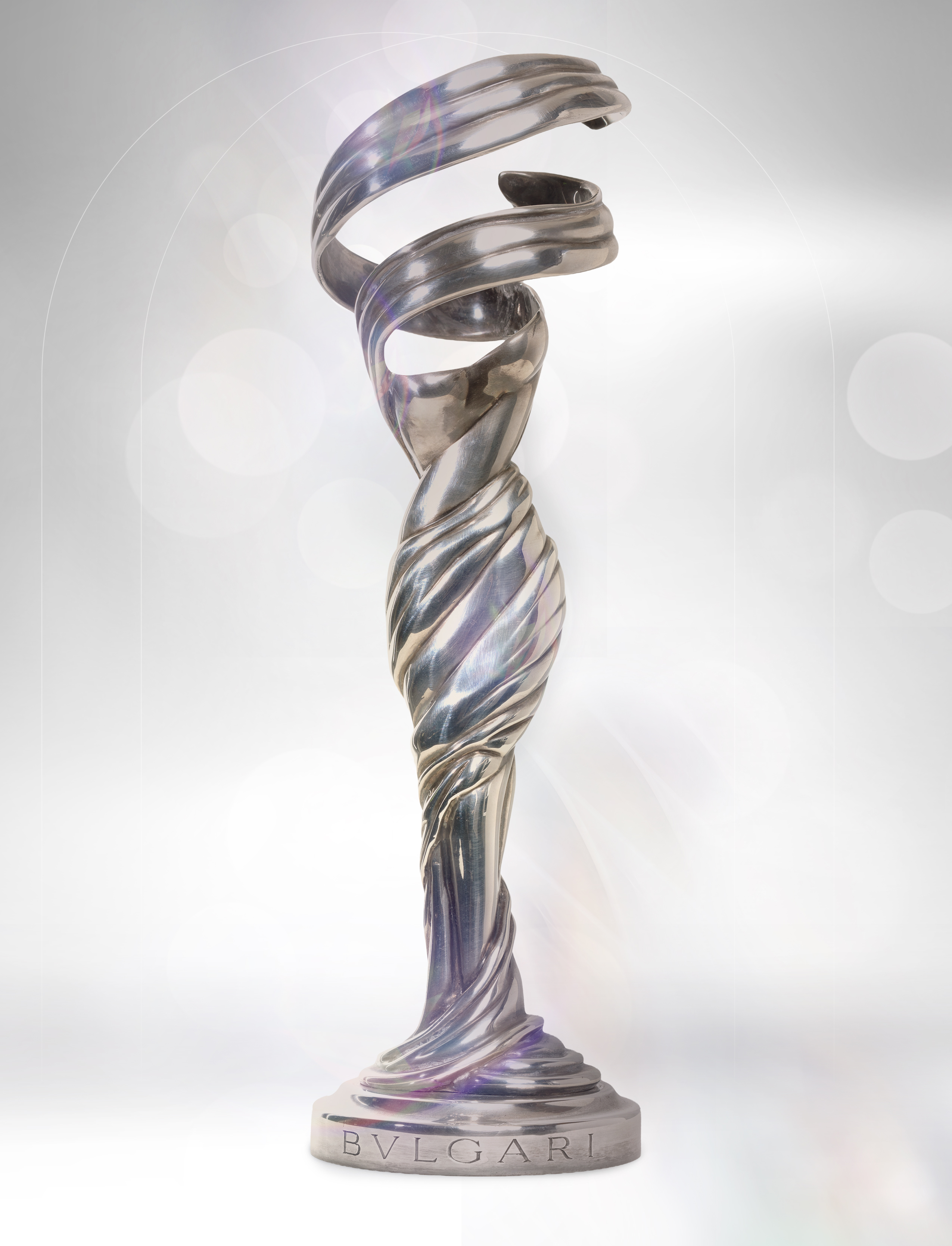



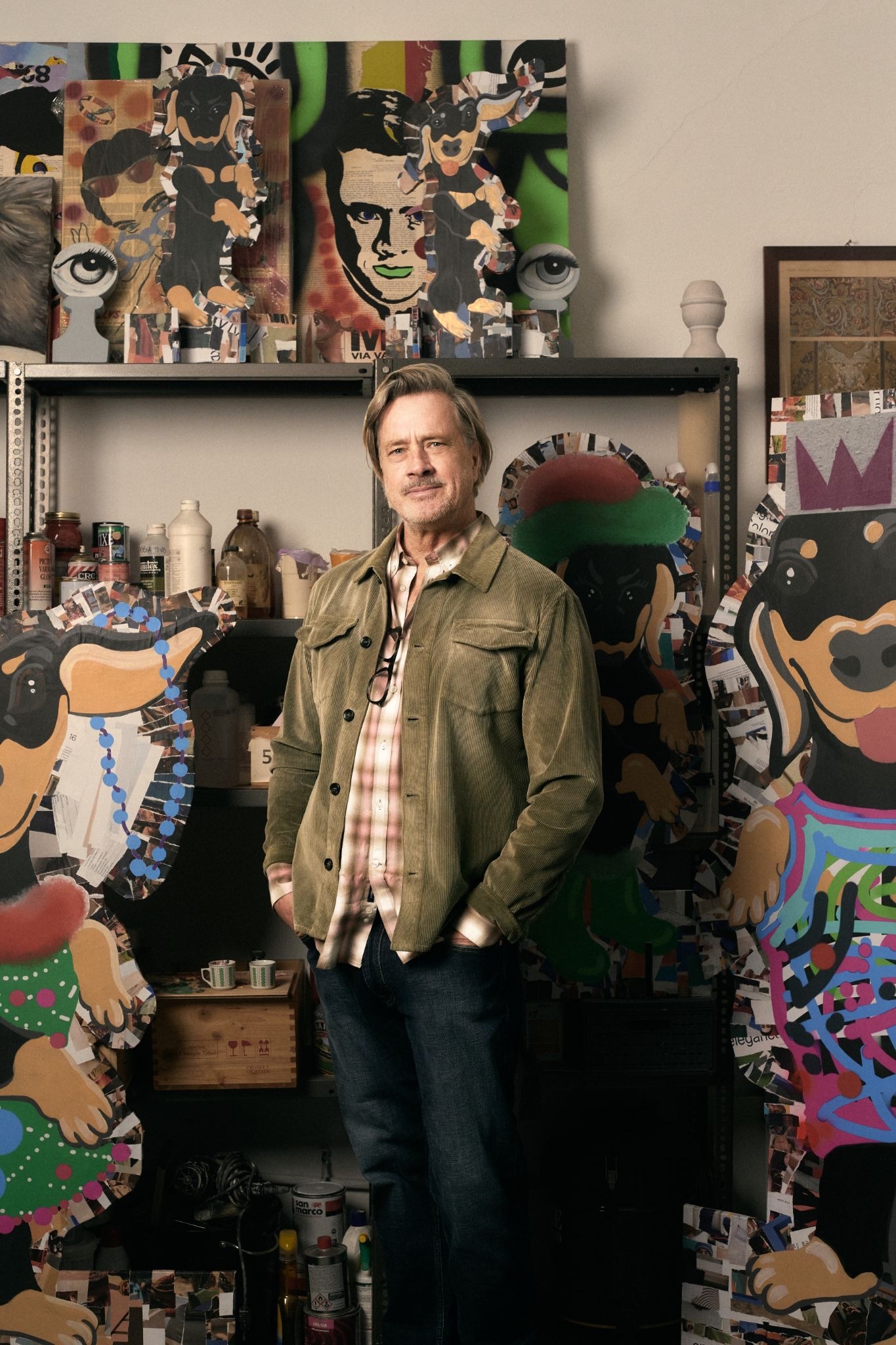
.JPG)
.jpg)

